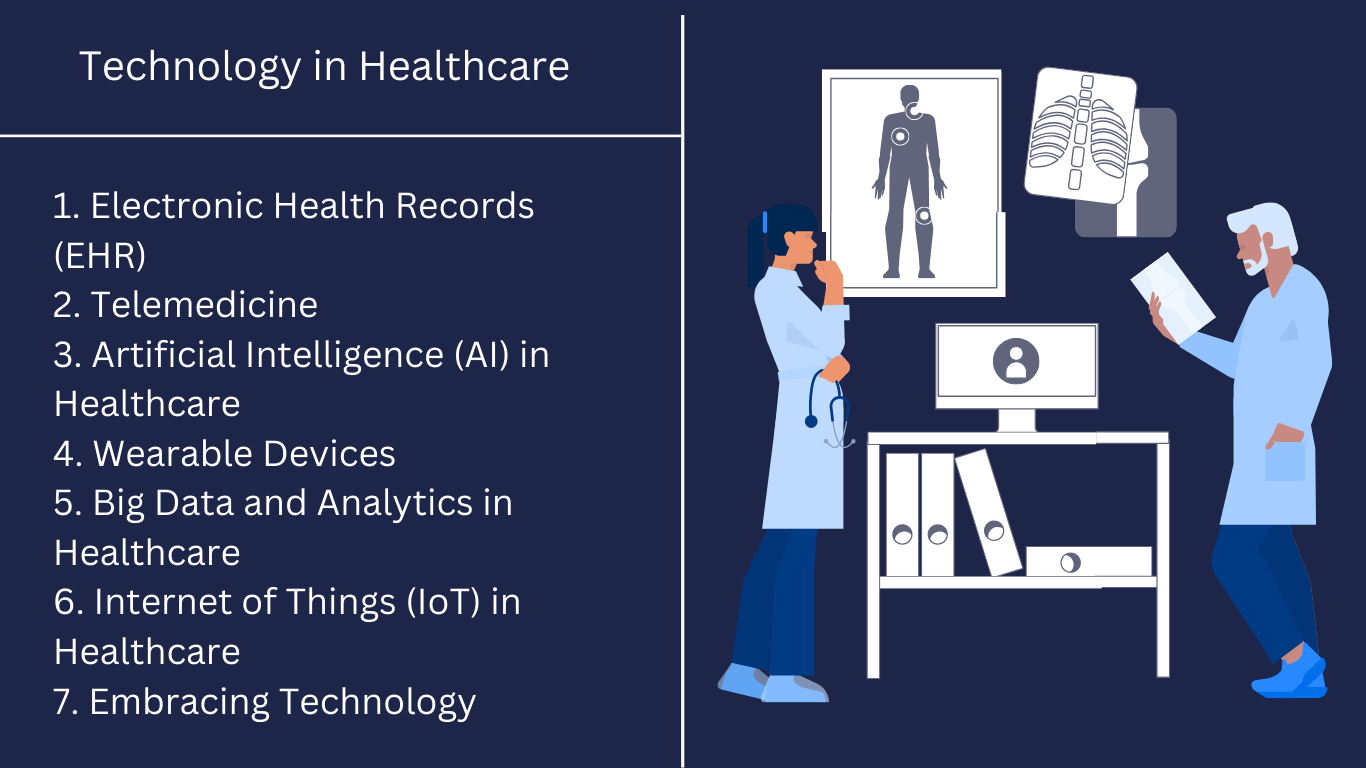Technology in Healthcare: The use of technology in healthcare is rapidly transforming the way medicine is practiced. From electronic health records (EHR) to artificial intelligence (AI) in healthcare, the possibilities for improving patient care and outcomes are expanding at an unprecedented rate.

In this article, we will explore the various ways in which technology is revolutionizing medicine and discuss the potential future advancements that will shape the healthcare industry.
Uses of Technology in Healthcare
Table of Contents
1. Electronic Health Records (EHR)
Electronic Health Records, or EHR, have revolutionized the way healthcare professionals store and access patient information. Gone are the days of paper-based charts and files. This not only improves efficiency but also enhances patient safety by reducing errors and ensuring accurate and up-to-date information.
With EHR, patient data is stored electronically, allowing for seamless integration and sharing between healthcare providers. EHR systems enable healthcare professionals to analyze patient data more effectively. Advanced analytics tools can identify trends and patterns in large datasets, leading to better diagnosis and treatment decisions.
2. Telemedicine
Telemedicine is another groundbreaking application of technology in healthcare. It allows patients to receive medical care remotely, eliminating the need for in-person visits in many cases. Through video consultations and remote monitoring, healthcare professionals can diagnose and treat patients without the constraints of physical distance.
Telemedicine has proven to be particularly valuable in rural and underserved areas where access to healthcare is limited. Patients can now receive expert medical advice without traveling long distances, saving time and money. Telemedicine also increases accessibility for patients with mobility issues or chronic conditions that require frequent monitoring.

As technology continues to advance, telemedicine is expected to expand further. The integration of artificial intelligence and virtual reality into telemedicine platforms will enhance the remote patient experience, making it even more immersive and interactive.
3. Artificial Intelligence (AI) in Healthcare
Artificial Intelligence (AI) has the potential to revolutionize healthcare in countless ways. From improving diagnostics to streamlining administrative tasks, the applications of AI in healthcare are vast. AI algorithms can quickly process and analyze large amounts of medical data, leading to more accurate and efficient diagnoses.
AI-powered chatbots are also becoming increasingly common in healthcare. These virtual assistants can provide patients with personalized medical advice, answer common questions, and even schedule appointments. By automating routine tasks, healthcare professionals can focus more on direct patient care.
AI algorithms can analyze medical images, such as X-rays and MRIs, to detect abnormalities and assist radiologists in making more accurate interpretations. By reducing human error and increasing efficiency, AI can improve patient outcomes and reduce healthcare costs.
4. Wearable Devices
Wearable devices, such as fitness trackers and smartwatches, are becoming ubiquitous in our daily lives. These devices are not only helping individuals monitor their physical activity and sleep patterns but are also playing a significant role in healthcare.
Wearable devices equipped with sensors can track vital signs, such as heart rate, blood pressure, and oxygen levels. This data can be transmitted to healthcare professionals, allowing for real-time monitoring and early detection of potential health issues. Wearable devices are particularly useful for patients with chronic conditions who require continuous monitoring.
For example, they can track sleep quality or detect signs of stress. By analyzing this data, healthcare professionals can offer personalized interventions and support to improve overall well-being.
5. Big Data and Analytics in Healthcare
The abundance of health data generated by electronic health records, wearable devices, and other sources presents a significant opportunity for healthcare analytics. Big data analytics can help identify patterns, trends, and correlations that can inform medical research and clinical decision-making.
Big data analytics can also help identify population health trends, enabling policymakers to allocate resources more effectively. By detecting outbreaks or predicting disease progression, healthcare systems can proactively respond to public health challenges.
By analyzing large datasets, healthcare professionals can gain insights into disease prevalence, treatment outcomes, and the effectiveness of interventions. This information can lead to the development of evidence-based guidelines and personalized treatment plans.
6. Internet of Things (IoT) in Healthcare
The Internet of Things (IoT) refers to the interconnection of everyday objects via the internet. In healthcare, IoT enables the seamless integration of various devices, such as wearable sensors, medical equipment, and home monitoring systems.
IoT also enables continuous monitoring of patients with chronic conditions, reducing the need for hospital visits and allowing for earlier intervention in case of deterioration. This not only improves patient outcomes but also reduces healthcare costs.

By connecting these devices, healthcare professionals can monitor patients remotely, gather real-time data, and intervene when necessary. For example, IoT-enabled devices can alert healthcare providers if a patient’s vital signs deviate from normal ranges or if medication adherence is compromised.
7. Embracing Technology
As technology continues to advance, healthcare professionals play a crucial role in embracing and leveraging its potential. Healthcare providers need to stay updated on the latest advancements and continuously enhance their digital skills.
This includes understanding how to use electronic health record systems effectively, leveraging artificial intelligence tools for improved diagnostics, and embracing telemedicine as an essential component of patient care. Healthcare professionals should also be open to the integration of wearable devices into their practice and utilize big data analytics to inform clinical decision-making.
Conclusion: Use of Technology in Healthcare
The future of healthcare is undeniably intertwined with technology. From electronic health records to artificial intelligence, wearable devices, and the Internet of Things, technology is revolutionizing medicine in ways we couldn’t have imagined a few decades ago.
The use of technology in healthcare improves patient outcomes, enhances access to care, and empowers healthcare professionals with valuable insights. However, it is important to remember that technology is a tool, and the human element of healthcare should never be compromised.
As healthcare professionals, it is our responsibility to embrace technology, continuously update our skills, and leverage its potential to provide the best possible care to our patients. By doing so, we can ensure that the future of healthcare is patient-centered, efficient, and compassionate.
